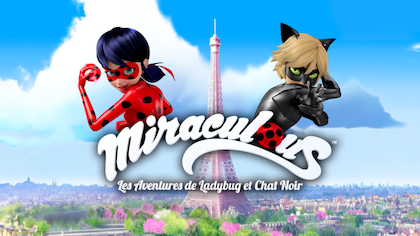Narcissism
3 Tips to Use Children's Television to Help Counter Narcissism
The Miraculous series' use of character virtue against narcissistic trauma.
Posted December 6, 2022 Reviewed by Vanessa Lancaster
Key points
- The Miraculous series uses character growth in storytelling which can teach how to counter narcissism.
- Psychological trauma can cause regression into more narcissism.
- Mindfulness, personal boundaries, and constructive decisions can help alleviate narcissism.

As a boy, I didn't have the countless television programming selections that we have come to enjoy today.
While only three years running, Gene Roddenberry's Star Trek was the most memorable show to capture my imagination. Today, it is considered one of the most impactful shows in television history to influence American culture.
It wasn't just the innovative science fiction that made Star Trek a phenomenon. It had to be the moral questions and profound psychological lessons that lighten our most universal human conflicts, dilemmas, and dreams—Shakespearean drama among the stars.
Today, my little son has taken to a new story universe to heart—with a similar diversity of character growth lessons (and narcissistic vices to avoid)—in the Paris-set animated series Miraculous.
As a 3D-animated, psychological tour de force by Thomas Astruc, Miraculous is rapidly growing in viewership among youth around the world—a population particularly struck by the traumatic hardships of the pandemic, with downturns in educational progress and a significant rise in suicide rates among numerous other psychiatric symptoms such as those of eating disorders, depression and certainly, anxiety.
In 2021, more than a third (37 percent) of high school students reported they experienced poor mental health during the COVID-19 pandemic, and 44 percent reported they persistently felt sad or hopeless during the past year (CDC, 2022).
We're all familiar with children's difficulties regarding adequate education through online and video learning during the pandemic. Given the negative pandemic impact on their mental health, I am greatly relieved that this show is doing something educational and helpful for their mental health.
The Miraculous Metaphor for Narcissism
Miraculous is both a binge-watchable sitcom and high-stakes superhero action series. In it, Marinette Dupain-Cheng and Adrien Agreste are students with alter egos as superheroes Ladybug and Cat Noir, who teach moral lessons to their classmates and each other.
Like Roddenberry, Astruc explores an entire canon of character virtues and vices—accomplishing this via the construct of the supervillain, Hawk Moth (Gabriel Agreste), Adrien's father.
As the iconic head of a house of fashion, Gabriel inadvertently kills his wife by gifting her a magical device central to the show's plot: the "miraculous"— gemstones that contain powerful spirits called "Kwamis."
In the elder Agreste's suffering over the traumatic loss of his wife, he makes the moral choice to spread his pain through continual rage on Paris's citizens and high school students. The regression to narcissistic behaviors can result from traumatic injury and loss.
As Hawk Moth, he conjures dark magic to turn innocent butterflies into "Akumas"—evil spirits that prey on their unwitting victims' minor traumas and social injuries.
It's a direct metaphor for the relationships between psychological trauma, psychological regression, and narcissism. Bad things happen to us, at which we can grow stronger character or fall into resentment, pessimism, and nihilism.
Research by Weller, et al. shows that aid to preadolescents in complex decision-making positively influences their outcomes two years later in the areas of peer conduct and emotional and behavioral prosocial behavior.
How do Ladybug and Cat Noir (and we) accomplish this?
The Basic Elements of Character as a Cure for Narcissism
If there were three working parts common to every character virtue—a failure that exists in every narcissistic vice we face—they would have to be mindfulness, personal boundaries, and constructive decisions.
These three exist in every episode of Miraculous, used by Ladybug and Cat Noir to save the day against the Akumas of narcissism.
Mindfulness Spots Narcissism
As students in the classroom, Marinette and Adrien are on the lookout for Akumas appearing as a "devil on the shoulder" of their classmates and offering temptation into the easy moral path: narcissistic vices of jealousy, greed, intolerance, gluttony, revenge, gossip and so many other human foibles.
The lack of mindfulness in the students and citizens of Paris lets them unwittingly be influenced by the evil butterflies. In contrast, the vigilant mindfulness that Marinette and Adrien employ spots the new narcissistic behaviors arising in their classmates.
We can't change or grow when challenges strike us in our everyday lives unless we are awake and aware of our emotions and behaviors.
Personal Boundaries Stop Narcissism in Its Tracks
Destructive behavior and painful emotions can't be dealt with if we aren't mindful when they arise. Once we become aware that our traumas are running our negative behaviors, we need to confront and engage them. Boundaries are part of the character virtues that combat narcissistic behavior in the bad guys.
The citizens and students of Paris, under the narcissistic influence of the Akumas, don't realize that their boundaries can both act as a shield against traumatic interactions. Nor do they see that gaps in their boundaries allow them to negatively "pay it forward" in trauma they now cause others.
Together, the teen heroes use their Kwami "powers" to confront the villains with good boundaries—revealing the underlying trauma that gave rise to the villain's narcissism and descent in character.
Constructive Decision-Making Gives Narcissism a Path to Recovery
The students and citizens of Paris can now see the moment of their narcissistic injury, which started them on a cascade of bad decisions that unwittingly harm others.
It is here where Hawk Moth's spell is broken, and the evil little butterfly emerges from the villain's person. Now visible, it is scooped up by Ladybug and transformed into its original, pure, innocent form again.
Like the insight with which a therapist may "confront" a patient, the "catharsis"—or emotional outpouring of trauma—can resolve the inner conflict.
For the villains of Miraculous, greed gives way to generosity, intolerance gives way to welcoming, and jealousy gives way to aspiration through constructive, mature decisions that lead to growth and harmony again.
Television as Teacher and Psychological Mentor
Revered mythologist and philosopher Joseph Campbell once spoke about the gravity of responsibility in storytelling. In The Power of Myth (1988), he states, "What is unfortunate for us is that a lot of the people who write these stories do not have the sense of their responsibility. These stories are making and breaking lives. But the movies are made simply to make money."
Our traumas don't have to make us permanent villains. Even adults will learn and prosper from watching Miraculous with the young, showing children the superhero "Kwamis" that are our social instincts—can always be guided to do right with mindfulness, boundaries, and constructive decisions.
References
CDC (2022). New CDC data illuminate youth mental health threats during the COVID-19 pandemic. CDC Press Release.
Weller, Joshua, et al. (2014). Preadolescent Decision-Making Competence Predicts Interpersonal Strengths and Difficulties. Journal of Behavioral Decision-Making.
Blum, Harold (2003). Psychic Trauma and Traumatic Object Loss. Journal of the American Psychoanalytic Association, vol. 51, issue 2.
Ronningstam, Elsa (2011). Psychoanalytic Theories on Narcissism and Narcissistic Personality. The Handbook of Narcissism and Narcissistic Personality Disorder: Theoretical Approaches, Empirical Findings, and Treatments, Chapter 5.Wiley & Sons.
Campbell, Joseph with Moyers, Bill (1988). The Power of Myth. Anchor Publishing.




